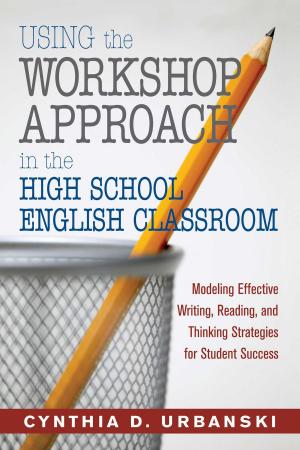Brain-Compatible Activities, Grades 6-8
Nonfiction, Reference & Language, Education & Teaching, Administration, Teaching, Teaching Methods| Author: | David A. Sousa | ISBN: | 9781510701144 |
| Publisher: | Skyhorse | Publication: | January 19, 2016 |
| Imprint: | Skyhorse | Language: | English |
| Author: | David A. Sousa |
| ISBN: | 9781510701144 |
| Publisher: | Skyhorse |
| Publication: | January 19, 2016 |
| Imprint: | Skyhorse |
| Language: | English |
Brain research has provided a tremendous opportunity to develop instructional techniques that facilitate the brain's innate learning capacity. As educators, we can take this knowledge and apply it to the strategies we use in our classrooms.
This essential resource, based on David A. Sousa's best-seller How the Brain Learns, Third Edition, provides ready-to-use, brain-compatible activities that feature some of the following strategies:
Graphic organizers
Mnemonic devices
Cooperative learning
Movement to enhance retention
Music to stimulate brain activity and creativity
These activities, correlated with national standards, cover all the content areas in grades 68 and include topics such as vocabulary, characterization, percentages, word problems, family history, historical research, mitosis, chemical equations, and much more!
The more we understand how the brain learns, the more instructional options we have. This unique resource helps you make the most of the brain's learning potential and transform your teaching practices to engage every student in your classroom.
Brain research has provided a tremendous opportunity to develop instructional techniques that facilitate the brain's innate learning capacity. As educators, we can take this knowledge and apply it to the strategies we use in our classrooms.
This essential resource, based on David A. Sousa's best-seller How the Brain Learns, Third Edition, provides ready-to-use, brain-compatible activities that feature some of the following strategies:
Graphic organizers
Mnemonic devices
Cooperative learning
Movement to enhance retention
Music to stimulate brain activity and creativity
These activities, correlated with national standards, cover all the content areas in grades 68 and include topics such as vocabulary, characterization, percentages, word problems, family history, historical research, mitosis, chemical equations, and much more!
The more we understand how the brain learns, the more instructional options we have. This unique resource helps you make the most of the brain's learning potential and transform your teaching practices to engage every student in your classroom.















